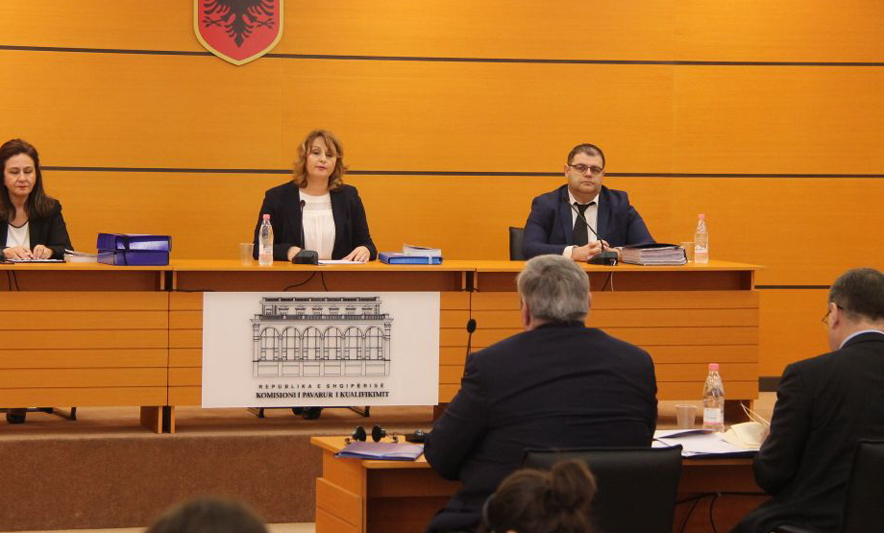
All the appeals filed by the Public Commissioner regarding judges and prosecutors who have resigned were filed after the deadlines determined by Law no. 84/2016 “On the Transitional Re-Evaluation of Judges and Prosecutors” had already passed.
To date, the Public Commissioner has appealed the Independent Qualification Commission (KPK) decision to interrupt the vetting of judge Mirela Fana, and prosecutors Sulejman Tola and Adriatik Llalla, all of whom had resigned.
According to art. 63 of Law no. 84/2016:
1. The decisions of the Commission shall be appealed within 15 days from its notification in the Appeal Chamber by the Assessee and the Public Commissioner.
2. The Appeal shall be submitted to the Commission which has issued the decision according to article 46 of the Law “On the organisation and functioning of administrative court and the adjudication of administrative disputes”.
The law also determines the deadlines for the appeal process. So, article 48 of Law no. 49/2012, “On The Administrative Courts and Adjudication of Administrative Disputes” provides:
1. The court where the appeal has been submitted sends the appeal, together with the acts attached to it, the decision of the judge on acceptance of the appeal, the acts of communication of the appeal as well as the file of the trial to the Administrative Court of Appeal within 15 days from the date the appeal is deposited.
Additionally, article 67, “Reinstatement of time limits”, of Law no. 84/2016 states:
1. When the assessee and public commissioner have lost the right to appeal they may submit a request within 15 days, from the date that the he or she becomes aware of the reason, but not later than the decision taken by the Assembly as provided in article 179/b, paragraph 9 of the Constitution.
The case of judge Mirela Fana and Kruja prosecutor Sulejman Tola
Both subjects resigned based on the vetting law. KPK decided to halt their vetting process on March 23, 2018, based on article G of the Annex to the Constitution that states: “the assessee may resign from the office and is not assessed any further.” as well as article 56 of Law no. 84/2016 “On the Transitional Re-Evaluation of Judges and Prosecutors” that states: “ In case of resignation, the Commission shall issue a decision on the cessation of the re-evaluation procedure.”
These two articles were also interpreted by Constitutional Court ruling no. 78, dated 12.12.2017, that states, in §43:
Article 56 of the law, allows the subject that resigns within the three-month deadline, to receive a transitory payment according to the existing legal provisions, something the laws does not allow subjects that resign after the deadline has passed. The Court stresses that, as long as the reassessment subject is in duty, and the reassessment process has not concluded, they have the right to resign and, in that case, the reassessment process will be interrupted, as provided by article G of the Annex to the Constitution.
The KPK ruling provided that the decision could be appealed at the College of Appeals within no more than 15 days from the day it was announced.
However, the Public Commissioner filed the appeals at the College on April 17, 2018, approximately 25 days after the decision was announced. The official website of the College of Appeals has yet to publish any deadline extension requests the Public Commissioner filed, if he indeed has filed any.
The situation repeated itself in the case of Adriatik Llalla. Following his resignation on February 10, 2018, KPK decided on February 16 to interrupt Llalla’s reassessment. The Public Commissioner appealed that decision on March 27, 2018, 39 days after the decision was announced, and 24 days after the legal deadline had passed.
Despite some voices in the media alleging that the Public Commissioner’s decision to appeal the KPK’s decision came after a criminal procedure against Llalla had begun in March at the Durrës Prosecution Office, under charges of “abuse of office” and “concealment of assets,” no official reason for reviewing the Public Commissioner’s late appeal has been made public on the College of Appeals website.

